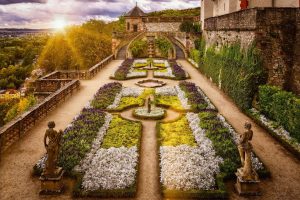Introduction
The Garden of Gethsemane holds immense significance in Christianity, particularly in relation to the events leading up to the crucifixion of Jesus Christ. Located at the foot of the Mount of Olives in Jerusalem, this garden is a place of great spiritual and historical importance. Its significance stems from the pivotal events that unfolded there, revealing deep insights into the nature of Jesus’ sacrifice and the core beliefs of the Christian faith.
 |
| Image from pixabay |
The Setting of the Garden
The Garden of Gethsemane is a peaceful and serene place with ancient olive trees that are believed to be over 2,000 years old. Its name, Gethsemane, is derived from the Aramaic word “Gat Shmanim,” which means “olive press.” This name reflects both the natural environment of the garden and the pressing anguish experienced by Jesus during his time there.
The Biblical Account
The garden is prominently mentioned in the New Testament of the Bible, particularly in the Gospels of Matthew, Mark, and Luke. According to these accounts, after the Last Supper, Jesus and his disciples made their way to the Garden of Gethsemane. It was here that Jesus experienced deep sorrow and anguish, knowing that his crucifixion was imminent.
Jesus separated himself from the disciples and spent hours in fervent prayer, asking God to “take this cup” from him if it was His will. It was in this moment of intense anguish that Jesus displayed his complete submission to God’s plan and ultimate sacrifice for the redemption of humanity.
The Significance of Jesus’ Prayer
Jesus’ prayer in the Garden of Gethsemane holds great significance in Christianity. It highlights his human nature, as he grappled with the weight of the impending crucifixion and the burden of the sins of the world. Through his prayer, Jesus demonstrated his unwavering trust in God’s plan, even in the face of immense suffering.
This moment also serves as an example for Christians, emphasizing the importance of prayer and surrendering to God’s will. It teaches believers to seek strength, guidance, and comfort in times of tribulation, just as Jesus did in the garden.
The Betrayal and Arrest of Jesus
In the Garden of Gethsemane, Jesus not only experienced emotional turmoil but also faced the betrayal of one of his disciples, Judas Iscariot. Judas, driven by greed, identified Jesus to the religious authorities, leading to his subsequent arrest.
This event underscores the Garden of Gethsemane as a significant location in the narrative of Jesus’ crucifixion. It serves as a reminder of the human frailty and the presence of betrayal even in the closest circles.
Symbolism and Spiritual Reflection
The Garden of Gethsemane holds profound symbolism in Christianity. It represents the place where Jesus willingly accepted his fate and embraced the mission of salvation. The garden signifies surrender, sacrifice, and the ultimate triumph of God’s plan over human suffering.
For Christians, the garden is a place for spiritual reflection and contemplation. It serves as a reminder of Jesus’ obedience and love, inviting believers to meditate on the depth of his sacrifice and find solace in their own struggles.</
p>
Pilgrimage and Reverence
The Garden of Gethsemane has been a site of pilgrimage for centuries. Christians from around the world visit this sacred place to pay homage to Jesus’ sacrifice and to seek spiritual renewal. The garden’s serene atmosphere and historical significance provide a powerful setting for prayer and reflection.
Within the garden, there is a church called the Church of All Nations, which commemorates Jesus’ prayers and the agony he experienced. The church’s beautiful architecture and symbolic artwork add to the reverence and significance of the site.
Conclusion
The Garden of Gethsemane stands as a poignant reminder of Jesus’ profound sacrifice and his unwavering faith in God’s plan. This sacred place invites Christians to reflect on the depth of Jesus’ love, his submission to God’s will, and the importance of prayer in times of adversity.
Through its historical and spiritual significance, the Garden of Gethsemane serves as a powerful symbol of hope, redemption, and the ultimate triumph of good over evil. It continues to inspire and draw believers from all walks of life to seek solace, strength, and spiritual connection in the heart of this hallowed garden.
